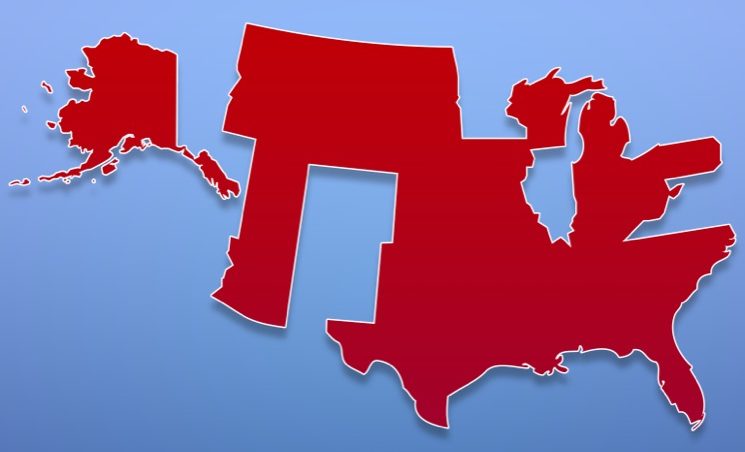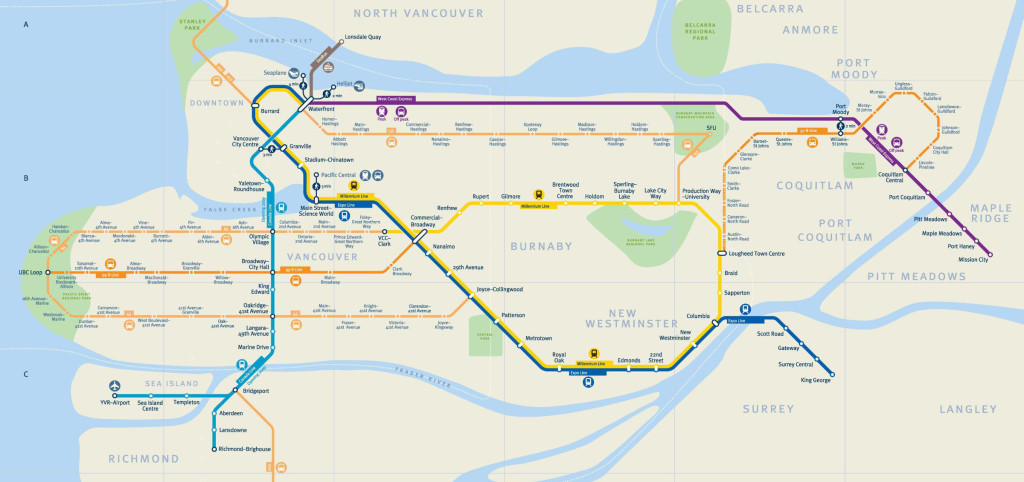
And what the hell do we do now?
By Rebecca Peterson, Humour Editor
I was on the SkyTrain when the results first started pouring in from the election. My sister texted me to tell me that Trump was in the lead.
It was beyond surreal, staring at the numbers on my phone. I knew it could happen, of course. In fact, I knew it was far more likely to happen than we’d given it credit for. But actually sitting in that moment, living in this new world that was taking shape around me, all I could think to text back was, “What if he actually wins?”
Many hours later my family sat grouped around the TV in my sister’s apartment, wine close at hand, as the news finally broke that Hillary Clinton had just called Donald Trump to concede the election. It was over.
As was the case for many people that night, there were tears. There was anger. I had messages coming in from friends of mine who live in the States, friends who voted against this result, all asking me the same question: What do we do now? How do we explain this?
What actually happened on election day
How did the polls get things so wrong?
Several news outlets have explained, post-election, what happened to the polls: They were never “right” to begin with. Many of these were telephone polls, and some of the people belonging to the demographics most likely to vote for Trump (specifically, Rust Belt evangelicals) were also not very likely to participate in such polls. As well, a large portion of the alt-right movement that voted for Trump was cultivated in young men who speak to one another online. These are men who genuinely believe that people of colour, women, and those of the LGBTQ+ community are all inferior to the straight white male. Out of fear of “persecution” by the “hysterical liberals” surrounding them, these voters were told to keep their Trump vote secret, only to show their hand on election day, which they did.
Since November 8, many have been looking for someone to blame. This has been called a failure of democracy, which can be argued when examining the difference between the popular vote and the vote of the electoral college. Third party voters have been blamed, people of colour supposedly not showing up to vote have been blamed (ignoring the very real existence of voter suppression laws and access problems for people in many communities), but I find that these arguments ignore the larger problem.
This was not a failure of democracy. This was, quite tragically, an accurate reflection of the mindset of much of the United States. A rhetoric of fear, anti-intellectualism, and distrust has been cultivated in large swaths of American communities. America has seen some hard times over the past few decades, and a failure of government—perceived or otherwise—has been blamed. Americans wanted change, and for those falling on the right side of the political spectrum, change looked like Donald Trump. It looked like a reclamation of the American Dream that was meant for them, not for immigrants. Not for people of colour. Not for the LGBTQ+ community. People from these marginalized groups would be the first to tell you that these prejudices have existed in dangerous amounts of intensity for years. In fact, they have been telling us. It’s horrifically ironic to see those who’ve been saying “It can’t possibly be as bad as all that” turn around and ask, “When did America get so racist? So sexist? So homophobic?” These mindsets have always existed, and now, a reckless demagogue and his motley crew of like-minded opportunists have pressed their advantage, and taken the country. Democratically.
“Love thy neighbour”
There has been a message continuously repeated by politicians, protestors, and pundits alike since Trump was declared President-Elect: The only way through this is to love one another. To understand one another. To hope. To extend empathy.
It’s not a terrible idea. The last thing anyone wants to do is pour kerosene on the flaming dumpster fire that is the present American society. However, we can’t expect people directly affected by this to embrace that message uncritically. Black people in America now have a President-Elect who endorses the unconstitutional Stop-and-Frisk program. Muslims in America now have a President-Elect who sees them as personally responsible for the actions of Daesh, a twisted branch of Islam that barely resembles what most Muslims genuinely believe. LGBTQ+ people in America now have a future Vice President who endorses shock therapy and other methods of torture to “cure” them of something they cannot change, and should not have to. We can keep repeating “love each other,” but we should also extend that empathy and understanding to those who now have to walk the streets of their cities, not knowing if the people they pass by voted with such hatred or at best, such lack of care for others.
Since the election, like after the Brexit vote, there has been a rise in hate crimes and incidents of discrimination across the country from emboldened bigots. The Trump victory is a victory for the rhetoric of hate and superiority. It confirms that much of this behaviour will reap no consequences for those who participate in it. Hispanic-Americans have been told to leave the country. Muslim women have had their hijabs grabbed at, or ripped away entirely. Black people have been told to get back to the plantations and start picking cotton. On social media—Twitter and Facebook especially—reports of violence and harassment are on the rise. The infected underbelly of America has now been exposed. Those who belong to the alt-right movement have never felt more empowered, more right in their beliefs. How can we extend understanding, empathy, or friendship to those who truly believe these terrible things about the people around them?
Plans of action, hope for change
There has been a plethora of suggested responses: calls for revolution, for recounts, for impeachment.
The idea to impeach Trump might have some real merit. Over the next few months the President-Elect still has many legal cases to square away, between sexual assault allegations and lawsuits for fraud and outstanding debts. These are grounds to suggest he might not be suitable for presidency, legally.
But what happens then? Even if Trump is no longer a factor, there’s still his running mate, Mike Pence, to consider. Pence is arguably more dangerous than Trump. He is easily more fervent and steadfast in his beliefs, and he has political experience. Getting rid of Trump does not solve the underlying problem that has now been exposed: At least half the country believes in a genuinely dangerous, horrific rhetoric. That will not go away with Trump out of the picture. One could argue that Trump’s buffoonery and lack of political experience is actually helpful, in that he’s hard to take seriously, and more likely to make mistakes. Lord help us if he were actually intelligent.
More concerning is the rise of the alt-right worldwide, thanks to Trump’s victory. There have been reports of white supremacist groups like Golden Dawn rearing their ugly heads again in Europe, and even in Canada there are many who think that Donald Trump’s victory is a good thing. Conservative leadership hopeful Kellie Leitch recently sent out an email claiming that Donald Trump’s victory is “an exciting message and one that we need delivered in Canada.”
This is not just an American problem, and it would be dangerously shortsighted to see it as such.
Protests have erupted, not just across the incredibly divided United States, but around the world as well. There have been protests in Vancouver this past week, as well as in London, Tel Aviv, and other cities across the globe. To my friends in America during that horrible night of loss and confusion, I repeated the same message again and again: You are not alone. The world is with you.
There has been a growing movement to help combat the general atmosphere of uncertainty and fear in the States. People have taken to pinning a safety pin on their clothes, in plain sight, as a simple symbol of solidarity with those most affected by this election. The safety pin says, “I am a safe place. I am on your side.” When I travel to America this coming weekend, I plan to wear the biggest safety pin I can find.
TrumpLand, and beyond
No one can say for sure what the future is going to look like.
We can guess and we can speculate. We can draw from historical precedence, and we can make comparisons to pre-Nazi Germany, the rise of fascism in Italy, or Donald Trump’s good friend Putin’s iron grip on Russia. But every case is different, and disaster to some looks like hope and opportunity to others. This has always been the way of things, and sadly the world is not as clear-cut between good and evil as we would like.
The worst thing we can do, however, is look away.
Everyone is exhausted from this election, mentally and emotionally. No one wants to keep their minds wrapped up in American politics longer than they have to, especially when the results have been so incredibly disheartening. The memes, the New York Times articles, and the angry rants from conservatives and liberals alike have cluttered our Facebook feeds for far too long, and it’s understandable to want a break.
We Canadians live in an awkward privilege, in that while we feel personally affected by the political atmosphere of the States, we can—to a certain extent—step out of the room. We can decide that we don’t want to watch our neighbours through the living room window any longer, and we can look to our own borders. We can say this doesn’t concern us. But this, unfortunately, is just not true.
The rise of bigotry and the return of the alt-right is, as previously mentioned, a worldwide problem. It’s up to us to remain informed, stay educated, recognize our place in the world, and decide what kind of environment we want to create for the people around us. Will we stay quiet when we hear people say that immigrants are taking our jobs, that Muslims are terrorists, that LGBTQ+ people are fine when we “don’t have to see it?” Do we pretend that these mindsets are normal, or just as valid as acceptance? Do we ignore hatred when it doesn’t directly affect us?
The state America is in is a warning. It’s a call and a challenge to the rest of the world, asking us what we will accept. How much empathy we have for others who do not share our religion, our ethnicities, our ideas of morality. It asks us how much we’re willing to do to really make this world a better place for our children, for the people of today and tomorrow.
The election is over, but the work—the real work—is just beginning.



